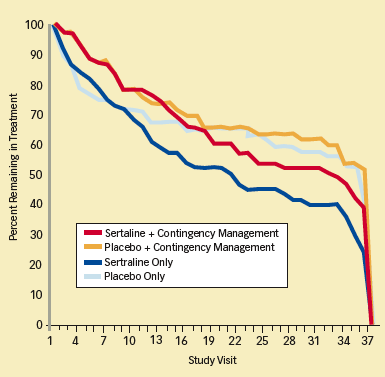 |

Selective serotonin reuptake inhibitors do not relieve the depressive symptoms of methamphetamine withdrawal and may produce unpleasant side effects.
BY ELIZABETH ASHTON, NIDA Notes Staff Writer
In a recent NIDA-funded study, the antidepressant sertraline (Zoloft) made quitting methamphetamine harder. Prescribed to relieve depression during the methamphetamine withdrawal process, sertraline produced a number of unpleasant side effects and may have interfered with behavioral interventions as well.
Dr. Steven Shoptaw, Dr. Alice Huber, Dr. Walter Ling, and their colleagues at the University of California, Los Angeles (UCLA) noted that methamphetamine abusers in withdrawal frequently complained of fatigue, lack of pleasure, sad mood, and persistent daytime sleepiness. The researchers hypothesized that the sertraline might alleviate these symptoms and promote abstinence because:
- methamphetamine is toxic to several pathways that produce the neurotransmitter serotonin;
- sertraline belongs to a class of antidepressant medications, the selective
serotonin reuptake inhibitors (SSRI), that treat major depression by raising serotonin levels in the brain.
HYPOTHESIS DISPROVED
The team recruited 229 men and women who were addicted to methamphetamine. All were between the ages of 18 and 65, and all were seeking treatment. The trial began with a 2-week preparation process. The researchers performed baseline testing and encouraged the participants to stop taking methamphetamine with the help of twice-weekly recovery skills groups. At the end of 2 weeks, they randomly assigned the participants to one of four groups: sertraline with contingency management (CM), sertraline alone, placebo with CM, and placebo alone. All participants provided urine samples on Mondays, Wednesdays, and Fridays and attended a 90-minute psychological support group three times a week based on the Matrix Model relapse prevention program. This standardized, manual-driven model is evidence-based and incorporates social learning, behavioral and cognitive therapies, and psychological and HIV-risk education.
| A TREATMENT FAILS THE TEST Participants receiving sertraline alone stayed in treatment for significantly less time than participants in all other treatment conditions. |
|
 |
The researchers evaluated methamphetamine use, time spent in the program, methamphetamine craving, and depressive symptoms. They found that:
- more participants in the CM program achieved 3 consecutive weeks of abstinence than participants who were not in the CM program (47 vs. 33 percent); all participants who received CM benefitted from this therapy, but its positive
effects were blunted in the sertraline-with-CM group.
- fewer participants on sertraline alone, as compared with those on placebo
alone (34 percent vs. 47 percent), achieved the goal of at least 3 consecutive
drug-free urine samples during the study's 12-week treatment phase; participants
on sertraline alone also attended fewer relapse prevention sessions and were more likely to drop out.
- craving and depressive symptoms were affected only by time since the last methamphetamine dose, and neither sertraline nor CM changed either of these two measures.
In addition, the sertraline group reported significantly more sexual, gastrointestinal (including nausea), and anticholinergic side effects.
RETHINKING WITHDRAWAL SUPPORT
The researchers concluded that treatment with sertraline did not relieve the depression associated with methamphetamine withdrawal or decrease methamphetamine use, and its side effects reduced the amount of time participants spent in treatment. Those who took sertraline also seemed to benefit less from behavioral interventions, and the researchers speculated that this might be due to the dampening effect of the medication since they had excluded all other possible factors in the statistical analysis.
The team recommends that clinicians not give SSRIs to people withdrawing from methamphetamine unless an underlying primary depressive disorder is definitively diagnosed. The recommendation reflects their own results and those of previous smaller studies with fluoxetine (Prozac) and paroxetine (Paxil), both of which were also found to have no effect on depressive symptoms during methamphetamine withdrawal. Together, these findings suggest that the etiology of mood disorder during methamphetamine withdrawal differs from that of primary depression.
The UCLA researchers suggest that clinicians offer people addicted to methamphetamine an effective behavioral intervention for depressive symptoms during the withdrawal process before prescribing any of the currently available pharmacotherapies for depression. If medication is needed, only non-SSRI antidepressants, such as bupropion, should be used.
"The SSRI sertraline is not only inefficacious for the treatment of methamphetamine dependence, but also produces a number of unprecedented side effects and has no effect on the secondary depression experienced during methamphetamine withdrawal," says Dr. Ivan Montoya, Clinical Director of NIDA's Pharmacotherapies and Medical Consequences of Drug Abuse Branch. "In addition, the negative effects of this SSRI in methamphetamine users are so powerful that they can dampen the strong therapeutic effects of contingency management. If these reactions can be traced to their source, they may help us understand the extent and duration of the effects of methamphetamine on the brain."
"We are trying to determine what people withdrawing from methamphetamine need to make withdrawal easier," Dr. Shoptaw says. "We've figured this out for other drugs, such as cocaine and heroin, but finding medications that counter the withdrawal symptoms of methamphetamine addiction is still a work in progress. We need this information so we can design treatment programs that help people get off and stay off this damaging drug."
SOURCE
Shoptaw, S., et al. Randomized, placebo-controlled trial of sertraline and contingency management for the treatment of methamphetamine dependence. Drug and Alcohol Dependence 85(1):12-18, 2006. [Abstract]
Volume 21, Number 5 (March 2008)
|
 |
|